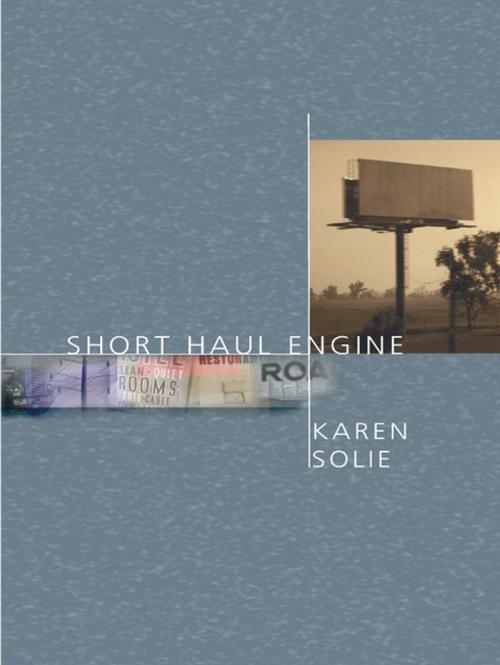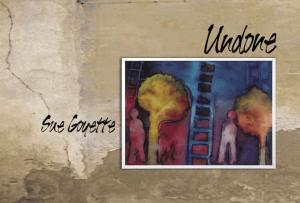| Author: | Karen Solie | ISBN: | 9781926829425 |
| Publisher: | Brick Books | Publication: | October 15, 2001 |
| Imprint: | Brick Books | Language: | English |
| Author: | Karen Solie |
| ISBN: | 9781926829425 |
| Publisher: | Brick Books |
| Publication: | October 15, 2001 |
| Imprint: | Brick Books |
| Language: | English |
Winner of the 2002 Dorothy Livesay Award for Poetry (BC Book Prizes), shortlisted for the 2002 Griffin Poetry Prize, the 2002 Gerald Lampert Award for first book and longlisted for the 2002 ReLit Awards.
Karen Solie takes risks with perception and language, risks that pay off in such startling ways that it's hard to believe this is a first book. Short Haul Engine is one great twist of fate and fury after another. The writing is clear, striking and open to all sorts of possibilities. Even at their most playful, these poems dive much deeper than initially expected. There's a remarkably dark sense of humour at work here, but tempered with a haunting vulnerability that makes even the sharpest lines tremble.
from "Signs Taken for Wonders"
... Too delicate for these dog-days,
small, clover-blonde,
my sister sews indoors.
I ask her to fashion me
into something nice, ivory silk.
I am a big girl, sunburnt
skin like raw meat, sweating
two pews in front of the Blessed Virgin....
Griffin Poetry Prize 2002 – Judges’ Citation for Short Haul Engine.
‘Karen Solie’s first book of poems, Short Haul Engine – a nice phrase for poetry – stood out for its mix of physical impressions, perceptual strength, and – especially – mental grace. A kind of liveliness, agility, connectivity. In “Early in Winter,” one of her many car poems, she writes, “feet cold, heart wagging its little tail.” A monstrous old fish, a sturgeon, is hauled out of the water by some teenagers, but then, “… when he began to heave and thrash over yards of rock/ to the water’s edge and, unbelievably, in,/ we couldn’t hold him though we were teenaged/ and bigger than everything. Could not contain/ the old current he had for a mind, its pull,/ and his body a muscle called river, called spawn.”
There is toughness here, as well as grace. Often in her pages, we encounter wisdom of a severity that we would almost rather not know. A cold person is a different species; there is a dismal companionship in grief, the water stays in the fish, even when the fish is out of the water. Short Haul Engine is not just an exceptional debut, it is an exceptional book.’
Winner of the 2002 Dorothy Livesay Award for Poetry (BC Book Prizes), shortlisted for the 2002 Griffin Poetry Prize, the 2002 Gerald Lampert Award for first book and longlisted for the 2002 ReLit Awards.
Karen Solie takes risks with perception and language, risks that pay off in such startling ways that it's hard to believe this is a first book. Short Haul Engine is one great twist of fate and fury after another. The writing is clear, striking and open to all sorts of possibilities. Even at their most playful, these poems dive much deeper than initially expected. There's a remarkably dark sense of humour at work here, but tempered with a haunting vulnerability that makes even the sharpest lines tremble.
from "Signs Taken for Wonders"
... Too delicate for these dog-days,
small, clover-blonde,
my sister sews indoors.
I ask her to fashion me
into something nice, ivory silk.
I am a big girl, sunburnt
skin like raw meat, sweating
two pews in front of the Blessed Virgin....
Griffin Poetry Prize 2002 – Judges’ Citation for Short Haul Engine.
‘Karen Solie’s first book of poems, Short Haul Engine – a nice phrase for poetry – stood out for its mix of physical impressions, perceptual strength, and – especially – mental grace. A kind of liveliness, agility, connectivity. In “Early in Winter,” one of her many car poems, she writes, “feet cold, heart wagging its little tail.” A monstrous old fish, a sturgeon, is hauled out of the water by some teenagers, but then, “… when he began to heave and thrash over yards of rock/ to the water’s edge and, unbelievably, in,/ we couldn’t hold him though we were teenaged/ and bigger than everything. Could not contain/ the old current he had for a mind, its pull,/ and his body a muscle called river, called spawn.”
There is toughness here, as well as grace. Often in her pages, we encounter wisdom of a severity that we would almost rather not know. A cold person is a different species; there is a dismal companionship in grief, the water stays in the fish, even when the fish is out of the water. Short Haul Engine is not just an exceptional debut, it is an exceptional book.’















